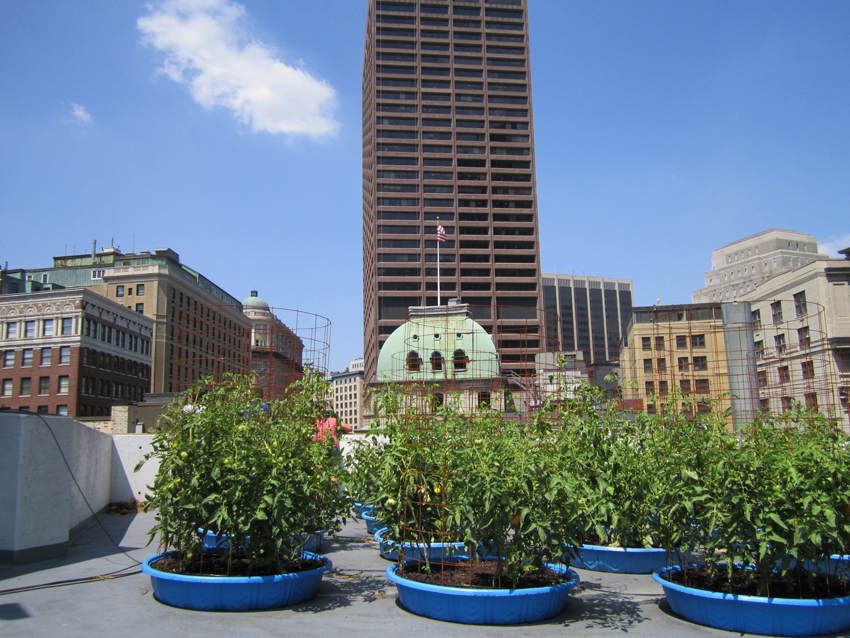Q&A: Green City Growers’ Jessie Banhazl

GCG’s B.Good garden. Photo provided
For city dwellers living in cramped apartments, starting a garden is often nothing but a faraway dream. Green City Growers (GCG) is trying to change that. The Somerville-based company helps private citizens, restaurants, and businesses start gardens wherever there’s room, from tiny rooftops to abandoned and forgotten land. We asked CEO and founder Jessie Banhazl what GCG is all about.
How did Green City Growers start?
Green City Growers began in 2008 as an idea to offer homeowners access to hyper-local produce from their yards via small-scale farm installations and maintenance. There were businesses doing this on the West Coast, but none in the area, so we went for it. In 2009 we also started partnering with businesses and restaurants to help them grow-their-own.
What’s your goal for GCG?
My goal for GCG is that we grow to a size and scale that is able to significantly impact the way people source their food. The more farms we install and consumers we teach how to grow food, the closer we get to a local sustainable food system.
Why is city farming an important thing for urban areas like Boston?
It’s important to try to reclaim unused space in cities like Boston to be able to grow on a smaller, more considerate scale than how the majority of produce available is being farmed—urban farms are on average half an acre to one acre, versus 2,000-acre factory farms in the Midwest. When you can see and feel the crops you will eventually cook and consume, you can control variables like pesticide application and eat fresher food than is available from the supermarket because it didn’t need to travel to get to you—just pick and eat! It’s also important for city-dwellers to engage in food production, even if it’s just having a visual understanding of how food grows by walking past an urban farm or front yard garden. So many urban kids and adults how no idea how to tell the difference between healthy and unhealthy food; it’s important to know what fresh looks like.
Why would you recommend someone start an urban garden? Are there health benefits?
Absolutely! There are health benefits in growing organically instead of with chemicals (conventionally), as well as the fact that produce is the freshest right after it’s picked. I would also say that having an urban garden actually promotes healthier choices when you’re at the market and eating out. Garden produce just tastes better because it’s fresher, and once you have that taste in your mouth it can be hard to go back. At Green City Growers we’ve been working on developing soil amendment strategies that will actually increase the nutrient density of the food we grow to make our produce even healthier for the consumer. There are also mental health benefits of gardening. Getting outside and working in the garden can be very therapeutic and meditative.
What are some of the most unique places you’ve installed a garden?
We do rooftop farm installations in partnership with a company called Recover Green Roofs, which I think are really unique. Roof space is perfect because it’s not being used for much, so converting it via a green roof system to a thriving urban farm can be really incredible. We have a 5,000-square-foot rooftop farm above Ledge Kitchen and Drinks in Dorchester for the restaurant, as well as an upcoming half acre farm that is currently being installed at a Whole Foods Market location in Lynnfield. The strangest site we have is our farm for B.Good restaurant downtown on the roof of Pi Alley parking garage, which consists of 25 kiddy pools filled with soil where we grow tomatoes and collards. We grow around 700 pounds of tomatoes there every year.
Urban farming seems to have grown in popularity recently. Why do you think that is?
I think people are starting to reconsider what they eat because health issues that are directly related to food have become very apparent recently. Food allergies, food safety scares, and the obesity epidemic are all tied to what we consume and the uncontrollable variables inherent to relying on large scale food production. I believe people are beginning to open themselves up to alternate ways to produce and consume food more than in the past. Urban farming is a great way to connect ourselves to the land, and to gain awareness about the space around us. Why not utilize the unused space nearby to nourish our ourselves, instead of relying on a increasingly unreliable supply chain?

Jessie Banhazl. Photo provided


